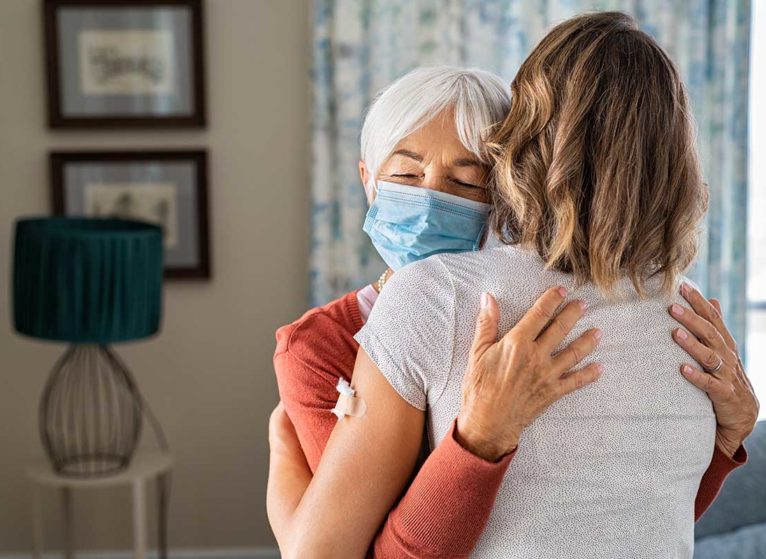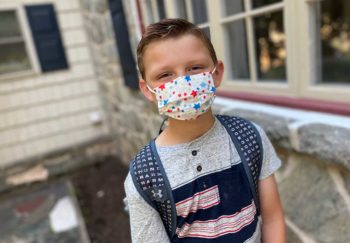We've all heard at least one myth about the COVID-19 vaccines. Fears that the government or “Big Pharma” secretly plans to track and control us through the vaccine. Or, on TikTok and Instagram, we see people with spoons stuck to their arms, claiming the vaccine made them magnetic. Many of these myths sound like conspiracy theory paranoia. But others reflect the very human fear of the unknown.
I've seen the full range of concerns in my own family. One told me that masks give you cancer. Another said the COVID vaccine had nothing in it. Others, some of whom actually did get vaccinated, still had doubts and questions. "It's just so new," they said. "We don't know what it will do to us, long term."
To which I said: I get it. COVID-19 and its variants are new to all of us. We're scared.
Getting Facts: Tricky Business
So much information bombards us daily. Even those of us who think we're savvy can get tricked by incorrect information. The other week, I heard a mainstream radio report asserting that the Pfizer and Moderna vaccines weren't protecting against the delta variant. I freaked out. I tried to look up the data and couldn't find it anywhere. The next day, I found out that the numbers came from an unfinished study in Israel. What had been reported as a fact turned out not to be true.
It's not surprising that so many Americans don't know who to trust. Our media outlets, political leaders, and community voices offer conflicting "expert" advice. The results are tragic: 67% of the unvaccinated believe at least one myth about the vaccine. Unvaccinated people are now experiencing surges of infections, hospitalizations, and death. This puts all of us at risk.
When Your Loved Ones Won't Get Vaccinated: What to Say?
When someone you love states a vaccine myth as fact, what do you say? As with most difficult conversations, listening is key. Some myths sound wacko. But some misinformation out there sounds like it could be true. If you get a chance to share your thoughts, having some facts in your back pocket can help.
Myths & Facts: Your Health & the COVID Vaccine
Myth: I can avoid COVID by masking/social distancing, so I don't need the vaccine to stay safe.
Fact: Wearing a mask and staying away from others definitely can protect you from infection. They're better than nothing at all.
But, these tactics aren't fail-safe.
It might help to understand that COVID vaccines don't just prevent infection. If you're vaccinated but get infected — which is rare, but possible — the vaccines reduce how sick you get and whether you go to the hospital or not. Masks and distancing alone can't do that. For the best protection, and especially for people who are immunocompromised, the vaccine plus masking and other tools will give you the most chance of avoiding infection and severe illness.
Myth: I'm relatively young and healthy, so if I get COVID, it won't be a big deal.
Fact: While being young and keeping a healthy lifestyle can reduce your chances of getting severely sick if you’re infected, it’s still no guarantee. As of November 3, the CDC reports that about 50,000 Americans under the age of 50 have died from COVID-19. A much larger number of people needed to be hospitalized but eventually recovered.
If you do happen to get infected, you also might wind up with long COVID, a long-term condition. Although most people who get COVID recover within a few weeks, long COVID symptoms stick around and continue affecting you for months after infection. Long COVID can happen whether you initially had mild, severe, or no symptoms of infection. It can cause:
- Breathing issues
- Fatigue
- Difficulty thinking or concentrating (sometimes called “brain fog”)
- Heart issues
- Pain in your chest or stomach
- Joint or muscle pain, sometimes after exercise
- Changes or loss in smell or taste
- Issues affecting multiple organs
Getting vaccinated is the best way to prevent getting infected with COVID-19 and spreading it to others.
Myth: The vaccine was rushed to market. It only has an emergency-use approval from the FDA. It's not legitimate.
Fact: They did rush the vaccine and get emergency approval, and thank goodness: That rush job saved lives. Evidence? Just look at the number of deaths before and after people started getting vaccinated.
But it's important to know a couple of things.
- The Pfizer vaccine has now received full FDA approval.
- Emergency-use authorization (EUA) doesn't mean that a vaccine is still in an experimental phase or hasn't been vetted thoroughly, or is dangerous. Before the FDA gave emergency approval, researchers used clinical trials to test the COVID-19 vaccines in tens of thousands of people. The vaccines met the Food and Drug Administration’s (FDA) rigorous scientific standards for safety, effectiveness, and manufacturing quality needed to support the authorization.
- Science is no rush job. Scientists have been working on drugs to prevent coronavirus infections for decades. If they hadn't, they wouldn't have had anything to rush to market at all.
Say what you will, scientists and the FDA follow strict procedures and guidelines when developing, testing, and approving drugs for human use. And COVID vaccines have undergone and will continue to undergo the most intensive safety monitoring in U.S. history.
See this FAQ about COVID vaccination from the CDC.
Myth: We don’t know the long-term effects of the vaccine.
Fact: Researchers have been working on these vaccines for a long time. Not to mention, most people — millions around the world, in fact — only get mild symptoms and no long-term side effects at all.
When serious or long-term side effects do come from a vaccine, they usually show up within 6 weeks of the shot. If the COVID vaccines posed any kind of threat to human health, evidence would have shown that by now.
Myth: The vaccine causes serious side effects, including seizures, tremors, and heart problems.
Fact: The vaccine can cause side effects, like mild heart inflammation and even rarer blood clots, in certain people, says William Petri, MD, infectious disease expert.
But these side effects are very rare. "About 1 in every 100,000 people who've taken the vaccine" get serious side effects.
That's nothing compared to the number of deaths caused by COVID: 1 in 600.
Getting side effects from a vaccine is normal. They don't mean you're sick with a disease. They mean your body is building antibodies to the virus.
Myth: The vaccine has a microchip in it that gathers information and tracks me.
Fact: The COVID-19 vaccines don’t contain any microchips or electronic components of any kind. Their only purpose is to build your immunity to COVID-19. In fact, information about the ingredients of the three vaccines used in the U.S. is available online from the CDC.
When you get your shot, you receive a card stating which shot you got, where you got it, and the date. State governments do keep this information in a database so that you can access it if you lose your card.
Your behavior is already tracked in many ways by lots of different companies — apps on your phone or smartwatch and websites you visit gather information on where you are, what you shop for, and what you look at on the internet. If organizations want to track you, they can do it without having to trick you into taking the vaccine.
Myth: I have an underlying condition, so the vaccine isn’t safe for me.
Fact: Some people I know thought having Type 1 diabetes meant they shouldn't get the vaccine. But in fact, it's the opposite. Underlying conditions, including diabetes, put you at a bigger risk for severe illness from COVID-19. Not only should you get vaccinated, but you should get the 3rd dose booster when it’s available for you.
Myth: I have allergies. An allergic reaction to the vaccine could kill me.
Fact: It's true, if you have certain allergies, you could have a reaction to the vaccine. At UVA Health, we have allergy experts at the COVID clinic to monitor these special situations. They can help you immediately if you have a reaction. Call us if you're afraid of having an allergic reaction to the vaccine.
Myth: Kids can’t spread the virus. Plus, if they get infected, kids only get a mild infection.
Fact: Children, like anyone else, can spread the coronavirus. COVID-19 moves from person to person by droplets that come out of noses and mouths via coughs, sneezes, and normal breathing. Even if they don't get symptoms, infected children can spread the virus to others who will.
Yes, COVID didn't hit kids as hard when the pandemic began. According to the CDC, more than 95% of COVID-19 deaths happen in people older than 45. But the number of cases in children have been rising recently. The delta variant spreads faster and hits harder than the first version of the virus. Unvaccinated children pose huge risks to their family members and the wider community.
It's also important to note that children with immune issues — kids with cancer, or who've had an organ transplant, for example — are very vulnerable to any kind of infection.
Myth: The COVID vaccine makes you infertile. And it isn’t safe for pregnant women.
Fact. No evidence exists that the vaccine hurts pregnant mothers, their babies, or the ability for men or women to have children.
Myth: If you're breastfeeding, the vax will give your baby seizures and infect them with COVID.
Fact: No scientific reports show evidence for anything of the sort. COVID-19 vaccines don't have the virus in them, so they can't infect mothers or babies.
What we have seen is that breastfeeding people who got vaccinated have antibodies in their breastmilk. The vaccine won't harm breastfeeding infants. It may, in fact, protect them. If you get the vaccine, some of the immunity you get from it can pass to your baby through breast milk.
Ready?
Schedule your vaccination today
Myth: If you get COVID, it's just like getting a cold/flu - no big deal.
Fact: The thing is, we do see trends of who gets sicker and even potentially dies from a COVID infection. But a fair percentage of people who don't fit the profile of a high-risk person also have severe reactions and die.
As of August 27, 2021, 652,261 Americans and 4,495,272 people around the world have died from the COVID-19 virus. Some of these people have been healthy and young. You may be lucky and not have symptoms if you get infected. But you could also die. No one can guarantee the outcome, either way.
Researchers continue to track long-term medical issues in COVID survivors.
Myth: I had COVID already. I'm immune now. I don't need a vaccine.
Fact: People who have had COVID once can still get it again. We don't know how long having had an infection protects you, but it certainly isn't forever.
This post was first published on September 6, 2021, and updated in November 2021.

